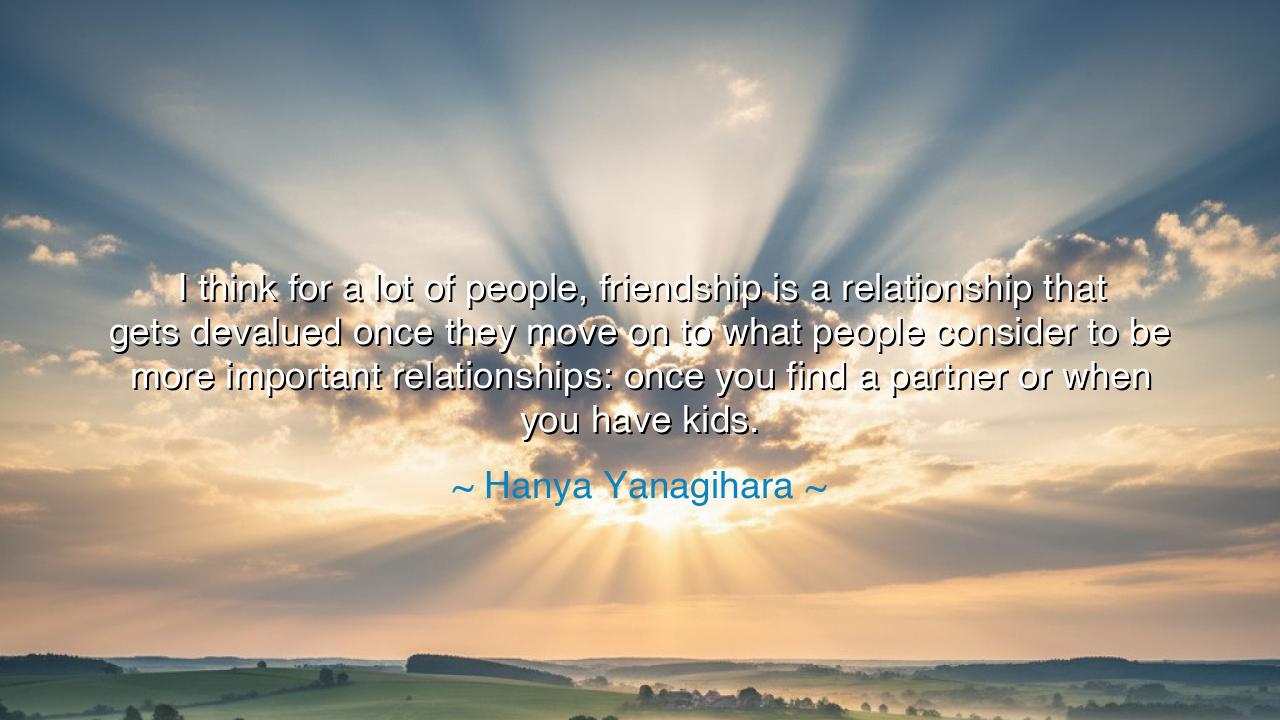
I think for a lot of people, friendship is a relationship that
I think for a lot of people, friendship is a relationship that gets devalued once they move on to what people consider to be more important relationships: once you find a partner or when you have kids.






In her meditation on human connection, Hanya Yanagihara speaks with the quiet sorrow of one who has seen friendship slowly fade under the weight of adulthood. She writes: “I think for a lot of people, friendship is a relationship that gets devalued once they move on to what people consider to be more important relationships: once you find a partner or when you have kids.” These words strike at a tender truth — that in our rush to fulfill the milestones of life, we too often abandon the bonds that once sustained our souls. Yanagihara, whose work delves into the deepest chambers of love, grief, and endurance, reminds us that friendship is not a lesser form of love, but one of its purest and most enduring expressions.
The origin of this quote comes from Yanagihara’s reflections on her novel A Little Life, a work that stands as one of the most haunting portraits of friendship in modern literature. Her story follows four men bound together across decades — through pain, loyalty, and silent devotion. It is a hymn to friendship as sanctuary, as family of choice rather than blood. In speaking this quote, Yanagihara gives voice to her philosophy: that the world has forgotten how sacred friendship truly is. In our modern age, she observes, society teaches us to prize romantic love, marriage, and parenthood as the “true” measures of fulfillment, leaving friendship as something transient, belonging to youth. Yet it is friendship — loyal, forgiving, and selfless — that so often saves the human heart from despair.
Throughout the history of civilization, friendship has been regarded as one of the highest virtues. The ancients called it philia — the love of equals, the meeting of souls without desire or possession. Aristotle himself wrote that friendship is “a single soul dwelling in two bodies.” The Roman philosopher Cicero, in his treatise Laelius de Amicitia, declared that friendship was “the sun of life” — more essential than wealth, power, or even family, for it is chosen freely and sustained by virtue, not obligation. How tragic, then, that in our age of speed and ambition, this most sacred bond is so often sacrificed at the altar of convenience. Yanagihara’s lament is not only personal — it is a call to remembrance.
One need only look to history to see how friendship has shaped destinies. The story of David and Jonathan, from the ancient scriptures, tells of two men whose love transcended politics, danger, and even death. Though Jonathan was the son of the king and David a shepherd destined to rise, their friendship was one of mutual reverence and loyalty. When Jonathan fell in battle, David wept not as a conqueror, but as a brother bereft. His cry — “Thy love to me was wonderful, passing the love of women” — stands as eternal proof that friendship can hold a depth no lesser than romance. It is this same truth that Yanagihara mourns in our modern age: that we have forgotten to honor friendship as sacred and enduring love.
Yanagihara’s insight also carries a quiet warning about the hierarchy of love that society imposes. We are told that maturity means leaving behind the friendships of youth to build partnerships, families, and careers — as though friendship were a childish pastime. Yet, as her novels show, friendship is often the one form of love that demands nothing but presence. It asks for no vows, no lineage, no legacy — only truth. To lose that is to lose one of the purest forms of companionship known to humankind. For while marriage and parenthood may define roles, friendship defines the soul. A friend is the mirror in which one’s truest self is reflected.
There is also in her words a plea for balance — to remember that life’s different loves need not compete but coexist. A partner’s love brings passion; a child’s love, purpose; but a friend’s love brings understanding. Each sustains a different part of the human heart. The tragedy, Yanagihara suggests, is that in the rush to sustain the first two, we too often let the last wither. True wisdom, then, lies in cherishing all — in keeping friendship alive as a lifelong covenant, not a youthful chapter. To do so is to keep one’s humanity intact, to remember that love need not always wear the guise of romance to be profound.
The lesson, therefore, is simple yet profound: do not let friendship become the forgotten love. In practical action, this means nurturing the bonds that once brought joy, calling the friend you have neglected, standing beside them in their silences as they once stood in yours. Set aside time not only for your family, but for those companions who have walked with you through the storms of life. For friendship, when honored, becomes the quiet thread that weaves meaning through the decades. As Hanya Yanagihara reminds us, when all else falls away — ambition, romance, even fame — it is the friends who remember us, who see us, and who, in loving us without claim, make us truly known.






AAdministratorAdministrator
Welcome, honored guests. Please leave a comment, we will respond soon